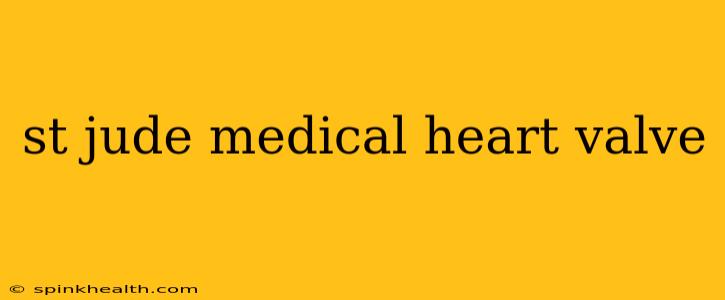My grandfather, a jovial man with a booming laugh and a heart as big as Texas, faced a daunting challenge: a failing heart valve. His cardiologist recommended a St. Jude Medical heart valve. This wasn't just another medical procedure; it was a life-altering decision impacting his entire family. This experience spurred my research into St. Jude Medical heart valves, and I'm sharing what I've learned to help others navigate this crucial area of cardiac health.
The journey toward understanding St. Jude Medical heart valves begins with grasping the different types available. There isn't a single "St. Jude valve"—the term refers to a range of prosthetic heart valves manufactured by Abbott Laboratories (which acquired St. Jude Medical). These valves are crucial for individuals whose natural heart valves are damaged or malfunctioning, hindering the efficient flow of blood.
What are the different types of St. Jude Medical heart valves?
St. Jude Medical, now under Abbott, offers various heart valve types, each designed to address specific needs and patient conditions. These generally fall into two main categories:
-
Mechanical Heart Valves: These durable valves are made of synthetic materials, such as pyrolytic carbon or titanium. They are designed to last a lifetime, but require lifelong anticoagulation therapy (blood thinners) to prevent blood clots. This is a critical aspect to consider as it impacts lifestyle and carries potential risks.
-
Biological Heart Valves: These valves are crafted from tissues derived from animal sources (typically bovine or porcine) or human donors. They offer the advantage of not requiring lifelong anticoagulation, which significantly reduces the risks associated with bleeding. However, biological valves have a limited lifespan and might need replacement over time. This is often discussed in terms of "valve durability" and expected lifespan.
Within these categories, there are various models with different designs and sizes, carefully selected to match each patient's unique anatomy and health condition. The choice between a mechanical or biological valve is a collaborative decision between the patient and their cardiologist, considering factors like age, overall health, and individual risk tolerance.
What are the benefits of St. Jude Medical heart valves?
St. Jude Medical heart valves, now manufactured by Abbott, have a long history and established reputation in the field of cardiac surgery. Some key benefits frequently cited include:
- Durability (Mechanical Valves): Mechanical valves are built to last a lifetime, eliminating the need for future replacement surgeries.
- Reduced Anticoagulation (Biological Valves): Biological valves often require less stringent anticoagulation therapy, reducing the risk of bleeding complications.
- Improved Hemodynamics: Many St. Jude Medical valve designs are engineered to optimize blood flow, minimizing turbulence and potential complications.
- Wide Range of Sizes and Designs: This ensures a customized fit for each patient, maximizing the success of the procedure.
What are the risks associated with St. Jude Medical heart valves?
While St. Jude Medical heart valves offer significant benefits, it's crucial to be aware of the potential risks associated with the procedure and the valves themselves:
- Infection: As with any surgical procedure, infection is a possible risk.
- Bleeding: Especially relevant to mechanical valves due to the requirement for long-term anticoagulation.
- Stroke: Blood clots can form in the heart, potentially leading to stroke.
- Valve Thrombosis: Blood clots may form on the valve itself.
- Valve Deterioration (Biological Valves): Biological valves have a finite lifespan and may require replacement.
How long do St. Jude Medical heart valves last?
The lifespan of a St. Jude Medical heart valve depends on the type of valve implanted. Mechanical valves are typically designed for a lifetime. However, biological valves degrade over time and may last 10-15 years or more, depending on factors such as the patient's age, overall health, and the specific type of biological tissue used. Regular checkups and echocardiograms are crucial to monitor the valve's function and identify any potential issues.
What is the recovery process like after getting a St. Jude Medical heart valve?
Recovery from heart valve replacement surgery varies depending on individual factors, the complexity of the procedure, and the patient's overall health. It typically involves a hospital stay of several days, followed by a period of recovery at home. This period involves gradual increases in activity levels, regular medication, and follow-up appointments with the cardiologist for monitoring. The recovery process is carefully managed to ensure proper healing and minimize the risk of complications.
My grandfather’s experience taught me that a St. Jude Medical heart valve, while a significant intervention, can be a life-giving gift. It's a decision that needs careful consideration, guided by open communication with your medical team and thorough understanding of the procedure’s benefits and risks. Remember, this information is for general knowledge and shouldn't substitute for professional medical advice. Always consult your doctor for personalized guidance regarding your heart health.

